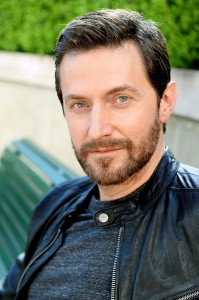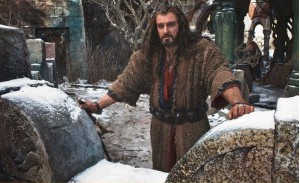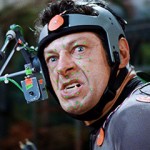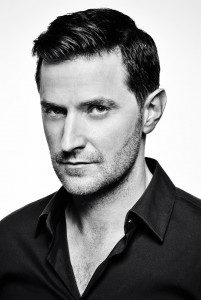 As readers will know from this post last week, Richard Armitage recently took the time to chat with TORn staffer greendragon. As ever, Armitage was gracious and erudite. His respect for his fans is evident, and he seems always ready to acknowledge their support, and share some time with them if possible.
As readers will know from this post last week, Richard Armitage recently took the time to chat with TORn staffer greendragon. As ever, Armitage was gracious and erudite. His respect for his fans is evident, and he seems always ready to acknowledge their support, and share some time with them if possible.
The interview covered the topic of getting ready for the upcoming release of The Hobbit: The Desolation of Smaug, and whether there might be even MORE pick ups next year in New Zealand. Also discussed at length was Armitage’s theatre training, and his approaches to the craft of acting. His first love, it seems, is classical theatre; and fans can expect to see him back treading the boards sometime in the not too distant future. Here are the highlights of what he had to say.
GD: How does it feel to be gearing up for Middle-earth Madness again?
RA: It feels like a millisecond passed since we were doing it the last time! It’s great; I mean, it’s like a whole new adventure because, you know, seeing little snippets of the movie and then at the World Wide Fan Event actually sitting through twenty minutes of the work that Pete’s been doing down in New Zealand since we finished pickups … it’s really exciting! So many new characters to explore; and feeling that fan response again was amazing.
People were so excited at the Fan Event – and that 20 minutes of footage was incredible!
It’s great isn’t it? Yeah – I was really pleased that he was able to treat the fans to that. He’s really good at that kind of thing – you know, giving them a little gift.
When you were doing the pickups earlier this year, what was it like finding your way back to the character? Was it hard, or did you just pick up where you’d left off?
 Do you know what? It was harder than I thought it was going to be. You always underestimate … putting on the wig and the costume, you think, ‘Oh I’m just going to be able to snap back into it.’ But actually, it took about 48 hours; that sounds like nothing, but the very first day of filming I had a really long scene, which took two days to shoot, with Ian. And I couldn’t find his voice again! I was going into my trailer and doing voice work to try and pitch the voice right. Luckily I wasn’t moving around, I was sitting down, so … I mean, all the ideas stay with you, and obviously I’d made quite a lot of notes, so I’d sort of swotted up beforehand, to try and remember where we were. The good thing about it was, a year on, having seen the movie and understanding the character a little bit more, I feel like there was a bit of germination that had happened. So there was another layer that I could add to the character. That went through all of the pick ups; whenever we were going back into scenes, there was a little bit more understanding of where the character had been, and where he was going to, which I felt was really useful, to giving it another dimension.
Do you know what? It was harder than I thought it was going to be. You always underestimate … putting on the wig and the costume, you think, ‘Oh I’m just going to be able to snap back into it.’ But actually, it took about 48 hours; that sounds like nothing, but the very first day of filming I had a really long scene, which took two days to shoot, with Ian. And I couldn’t find his voice again! I was going into my trailer and doing voice work to try and pitch the voice right. Luckily I wasn’t moving around, I was sitting down, so … I mean, all the ideas stay with you, and obviously I’d made quite a lot of notes, so I’d sort of swotted up beforehand, to try and remember where we were. The good thing about it was, a year on, having seen the movie and understanding the character a little bit more, I feel like there was a bit of germination that had happened. So there was another layer that I could add to the character. That went through all of the pick ups; whenever we were going back into scenes, there was a little bit more understanding of where the character had been, and where he was going to, which I felt was really useful, to giving it another dimension.
Do you think you are likely to find that there are more pickups next year? Once Sir Peter has edited this all together and he’s looking at the third film, do you think he’s likely to say, ‘Actually I need you to come back?’
We have nothing official at the moment; but knowing Pete, knowing what that third movie needs to be like, you know, his taste and what he’s aiming for, I have no doubt in my mind that we’ll be going back to do more stuff. Probably on a voluntary basis!! [laughs] On the last day of the shoot, he [PJ] put his arms around me, and he gave me a big hug and said, ‘See you next year.’ And I was like, ‘What, do you mean for the Premiere?” and he went, ‘No, no; we’ll be back here again…’ And I would go again and again for him; you know, it’s such a rewarding experience working with him. He really pushes you to the limit, and it feels so good to have gone further than you think you can. It’s a little bit like running through the finishing line, and then having to keep running. It’s a good feeling.
It’s interesting; your castmates I’ve spoken to have said the same thing: ‘Oh yeah, we’re sure we’ll have to go back, but we wouldn’t want it any other way!’
Yeah – it’s true. It’s been a long journey … and I think it’s going to get longer! [laughs]
You have an interesting theatrical training, in that you had both the experience of learning ‘on the job’ and learning in the college situation [at the London Academy of Music and Dramatic Art]. Could you say a bit about what you see as the pros and cons of both those ways of learning the craft of acting?
I was out in the business quite young; well, not by today’s standards in terms of acting, but at the time, I was working at about 16, 17, in musical theatre, and going to open auditions, queuing around the block to get seen in groups of six; and finding a singing teacher, getting a dance class – that kind of thing, just to get working … and really learning about theatre skills, like you say, on the job. And I realised that kind of – what’s called ‘tits and teeth’ performance – just really wasn’t stimulating me; and I began to be fascinated with text and Shakespeare and more classical works. I was going to private lessons with an acting coach, looking at those kind of ideas, and that’s when I decided that I was perhaps on the wrong path. So I went back to retrain at LAMDA, and I did a classical theatre course for three years, because I really wanted to immerse myself in that voice and text-based training. I came out and went to the Royal Shakespeare Company; that was really my goal, and I achieved it.
I seems to me that one can’t be at the Royal Shakespeare Company and not learn a lot.
It’s incredible what you do learn; and what you don’t realise you’ve learnt, as well. You know, I use a lot of Shakespeare, particularly with The Hobbit for example; knowing that text, being able to bring some Shakespearean ideas to something, to make it feel epic – but truthful, as well. So it’s amazing the things that I learned that I didn’t realise had gone into my long-term memory, if you know what I mean.
We talked about that a bit last December; about the Shakespearean roles that had given you thoughts about where Thorin comes from, and what drives him and motivates him.
 Yes; but also you know, that earlier training, the physical stuff, has become really, really useful in terms of coordinating the fights, and the stamina needed to train; and also creating a physical life for the character which is beyond the brain, you know? It’s a different manifestation; and I’d like to take that further, and even go into performance capture, and really change the body. One of the movies that I just love so much is the new Planet of the Apes movie; and Andy Serkis’ work, that kind of thing, I just think is fascinating, because you get absolutely to use all of those physical skills that you’ve picked up along the way.
Yes; but also you know, that earlier training, the physical stuff, has become really, really useful in terms of coordinating the fights, and the stamina needed to train; and also creating a physical life for the character which is beyond the brain, you know? It’s a different manifestation; and I’d like to take that further, and even go into performance capture, and really change the body. One of the movies that I just love so much is the new Planet of the Apes movie; and Andy Serkis’ work, that kind of thing, I just think is fascinating, because you get absolutely to use all of those physical skills that you’ve picked up along the way.
Thinking about Thorin and his physicality and his mentality… obviously you’ve got a lot of the backstory there for you in the book, and in the appendices. Did you feel that there were gaps that you had to fill in; did you create extra back story for yourself?
Yeah. I went in search of stuff and then I’d find ideas. I was really trying to work on the relationship between Fili, Kili and Thorin, so I wrote a biography a little bit about what happened on the battlefield at the Moria gates when he was fighting alongside his brother [Frerin, who was slain at that battle], and also the conversation that he had with his sister [Dís], who is obviously the mother of the nephews [Fili and Kili], when she was saying to him, ‘Don’t take them to war!’ (I’ve got a feeling Tolkien wrote something about that; I’m not sure whether Tolkien wrote it or whether I wrote it – it’s all morphed into one now!)
[GD note: pretty sure this conversation between Dís and Thorin is entirely RA’s creation; we know very little of Dís from Tolkien. I for one would be fascinated to read RA’s composition!]
Creating those kind of conversations which would have happened – I felt that was important. The relationships with my father and my grandfather, which are prominent in Thorin – I had to fill in a few of those gaps. Also, the dragon sickness or the gold lust which Tolkien talks about – actually playing a sickness like that required a little bit more development in terms of what it was going to be. Would it be a mental illness, was it going to be a physical illness; making choices about that… So yeah, there were a few bits and pieces that I had to expand upon.
I love the scene in the Extended Edition of The Hobbit: An Unexpected Journey where Thorin overhears the reservations which Gandalf and Elrond are discussing about the dragon sickness; that Thror and Thrain both succumbed, and how do we know that Thorin’s not going to succumb. It was so true to life; I thought it was just like if one had parents and grandparents who’ve had Alzheimer’s, and you’re facing that fear … it just seemed very real, very true.
Yeah. Actually, that was at the end of a much longer scene, which I played with Bilbo on those steps, where I talked about where I was born, and seeing fireflies on the roof; being born in darkness, underground; and then it cuts to that overheard conversation. And you realise that his childhood has been quite claustrophobic and insular, in terms of his upbringing and being raised as a prince, very much under the control of his father and his grandfather. I really worked hard on a very close relationship with Thror, because what I felt was that when we do get into those moments with the dragon sickness, later into movie three, I wanted Thorin to have been very, very close to Thror when he was going through that. Like he was almost nursing him through it, so he’s seen evidence of what it was like; so when it starts to manifest itself in him, he knows exactly what’s happening to him, and it’s terrifying.
When you’re creating a role like this, I’m curious about how much of yourself you bring to the role. We’re talking about real experiences in real life, which one references. Do you ever feel that you’re bringing too much of yourself, and that you need to step back and distance yourself a little?
You know, at drama school I had one teacher who used to say to me, ‘Don’t bring the role to you, take yourself to the role.’ Which is a bit of a paradox – because what he meant by that is don’t make a character into yourself, but go to the character. But in going to the character, you have to bring bits of yourself; you know, my voice will be in the character, the way that I move, the way that my mind connects with thoughts and movements, will all be in the character. So you can’t really leave yourself out of it completely. In terms of personal experience, this [Thorin] is quite easy to just use my imagination, because obviously you’ve got the book; and I’m not a dwarf, I don’t live in Middle-earth! Other characters which are much more similar to me and my life, and are contemporary settings – you have to work harder to separate yourself from them.
But there are things where you absolutely have to draw on your own experience; and sometimes that’s not even a literal experience. It can just be a sensation or a feeling, or your relationship to an event; my view on nobility for example, and what it really is… And those are the moments where I think, ‘No, I absolutely am going to bring my ideas to the table on this one.’ What I consider to be greed, for example – I thought a lot about that when I was preparing the role, because it’s where Thorin and I differ in our opinion about reneging on the deal with the men of the Lake; that fact that he promises them something and then reneges on that deal. I disagree with Thorin about that; but I have to play him, so … it’s kind of good to have that paradox.
So in some ways, from what you’re saying, if the role is closer to you – it’s a human role and it’s contemporary – you have to be careful that it isn’t just you, that you distance yourself. Do you think in some ways that in fantasy, where it’s a completely created world, it is easier to find a truth, than in something which is much more mundane, and closer to your daily life?
 Are you saying my daily life is mundane?! [laughs] No, you’re absolutely right. Weirdly enough though, it’s funny because sometimes if it feels like too much ‘acting’, it can really pull you out of character. That was the thing about Thorin; there were times when I really felt like I was acting; and I’d go to Pete and say, ‘Can we go again?’, because it just felt like I was ‘doing’ the character. The moments which are the most real and the most moving were the moments where I just wasn’t acting; I was just inhabiting what was literally another being, a whole body of clothing and a whole new face. All of that thing – you sometimes felt like you were inside of it. But there were times when I absolutely didn’t feel like that, and I was just all him. It’s hard to describe.
Are you saying my daily life is mundane?! [laughs] No, you’re absolutely right. Weirdly enough though, it’s funny because sometimes if it feels like too much ‘acting’, it can really pull you out of character. That was the thing about Thorin; there were times when I really felt like I was acting; and I’d go to Pete and say, ‘Can we go again?’, because it just felt like I was ‘doing’ the character. The moments which are the most real and the most moving were the moments where I just wasn’t acting; I was just inhabiting what was literally another being, a whole body of clothing and a whole new face. All of that thing – you sometimes felt like you were inside of it. But there were times when I absolutely didn’t feel like that, and I was just all him. It’s hard to describe.
It’s the Stanislavski point, isn’t it – that the more you’re aware of what you’re doing, the less effective it is.
Yes, absolutely. And the thing about film making as well, is that you do get the chance to disappear for a second. In a way, that’s why a lot of the time I would walk away from the group of people and stand and face the wall; because I didn’t want to break in to something which I’d found, whether it was the concentration, or just an understanding or the belief in the scene. So I think I got a bit of a reputation for being anti-social, because I’d be standing in the corner facing the wall like a weirdo, trying to stay in the scene! But it was just my way of feeling like I wasn’t acting when the cameras were rolling.
Thinking about going forward and what’s coming next, do you think you will return to the theatre, or maybe go back to music theatre? What are you envisioning for yourself?
You know what? I’m not ruling anything out; and I’m actually reading so much stuff at the moment. It probably won’t be music theatre, but – and I say this every time, and I think it really winds up the fans – but I have a very strong desire to get back on stage. I’ve been hunting for the right play; because it’s been a long time. I’m going to find something which I really want to do, and I’d love doing. And it will probably be something classical I think. I’m looking at quite a lot of smaller, independent movies with less special effects, as well. But yeah, I’m not ruling anything out.
[Our friends over at a Chinese Tolkien fansite have translated this interview; click here to check out Armitage’s words in Chinese! Thanks to Ringer Ryod for the translation.]


